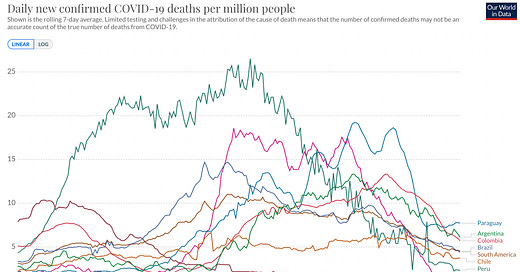Region - August 2021 Covid update
The region has gotten some good news. Now is the time to accelerate the progress.
Vaccinations are up. Deaths are down. But with the threat of the Delta variant growing, the region needs to speed up its efforts to vaccinate its citizens, not become complacent with the progress that has been made.
The pace of deaths and new infections is finally falling in much of South America
The chart above shows the rate of Covid-related deaths in South America has fallen by half since early May. While still too high, the reduction is great news for the region. With expanded vaccinations, the levels of deaths should fall further in the coming months.
The pace of vaccinations has picked up
About 44% of South America has received at least one vaccine dose according to Our World in Data. Some countries remain well below that number and the inequality in vaccine distribution remains a problem. Access to vaccines still outstrips demand in many countries.
Many of the countries with the highest rates of vaccination relied heavily on vaccines made in China and Russia that appear to provide less protection from the virus and do less to prevent the continued spread among the population (though they are statistically effective at preventing hospitalizations and deaths and any vaccine is far better than no vaccine). That is likely part of the reason why this recent wave has been so bad and why the levels of deaths in many countries, especially Chile and Uruguay, have not fallen further.
The region will likely see many countries that gave a first round of Russian or Chinese vaccines provide boosters from the United States where the vaccines have been more effective.
The Delta variant means cases may rise again, but deaths and hospitalizations can be minimized
The spread of the Delta variant in the United States and the rising cases and hospitalizations demonstrates the threat is not over in the region. It is quite likely that a new wave of cases will hit the region before the end of the year.
Renewed lockdowns are unlikely and unpopular. Most countries have reopened their economies and it’s far from politically feasible to shut them down again to stop the spread of the virus.
The fact that the wave will hit and other options aren’t possible should drive countries to move more quickly with vaccinations. Even a few additional percentage points a few weeks faster could save thousands of lives and prevent hospitals from being overwhelmed yet again.
The region should also watch how companies and governments in North America and Europe have gradually moved towards mandatory vaccinations and get policies in place before they are forced to make the same decisions under crisis.
The education crisis should be at the top of the agenda
Students remain out of school and the reopening of schools are likely to only be partial in the coming months. For many political and cultural reasons, countries have been slow to address the education issue even as they have rushed to reopen bars, restaurants and tourist areas. The damage being done to students throughout Latin America is severe, with the poor having very limited remote learning opportunities. There are secondary consequences including likely increases in dropouts and crime in the coming years as a generation of teenagers fails to complete grades and never returns to the classroom.
The politics of school reopening varies by country. In Mexico, the country’s powerful and corrupt teachers’ unions have opposed many measures to restart classes on a shifting set of excuses. On the other end of the spectrum, Peru just elected a public school teacher as president and he has promised to fully reopen schools as soon as possible, something that was very popular with the country’s electorate and a promise he will be expected to keep.
Countries should move as quickly as safely possible to approve vaccines for children and get every child vaccinated and back in school full time. Fixing the education crisis will provide a far bigger return on investment in the coming decades than any other economic measure countries implement this year to help their immediate business environment.
Thanks for reading
This newsletter is sent for free every Tuesday. If you know others who should receive this newsletter, please have them sign up at https://boz.substack.com
The newsletter is supported by paying subscribers. Please consider subscribing for $9 per month to receive additional content each week. Paying subscribers will see the usual Wednesday roundup of politics and polls in their inbox tomorrow morning.




